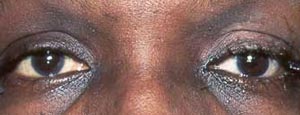
For people faced with the tragic loss of an eye from trauma, tumor or infection, Oculoplastic surgeon Dr. Amiya Prasad, M.D. can perform artificial eye surgery using the latest biomaterials such as hydroxyapatite to create an aesthetic and functional appearing eye.
Common Reasons to Get Artificial Eye Surgery
- Injury / Physical trauma to the eye
- Infection of the eye
- Disease / Eye tumors
- Glaucoma
What to Expect During Artificial Eye Surgery
Artificial eyes or prosthetic eyes are ocular prostheses made from cryolite glass or plastic acrylic. Dr. Prasad uses the latest biomaterials, such as hydroxyapatite, to create aesthetically-pleasing and functional-appearing artificial eyes. Hydroxyapatite is a naturally occurring substance that is very well accepted by the body. State of the art artistic implants are available that can be matched precisely to the healthy eye.
During the artificial eye surgery, the eye muscles are attached to a prosthesis implant. It does not restore vision to the wearer, although there are existing types of ocular prostheses that do. Surgeons are able to coordinate the movement of the artificial eye with the functioning eye, however, expect that the movement of the artificial eye will not feel as fluid or fully mobile as a normal eye would.
It must also be said that though the pupil area of the artificial eye may appear quite similar in color to your existing eye, the pupil will not react as it normally would when there is a change in light.
After Artificial Eye Surgery
Oral antibiotics and antibiotic eye drops may be prescribed as maintenance treatment after artificial eye surgery, but this will depend on your surgeon.

Feel free to contact us at any of our offices and set up a consultation with Dr. Amiya Prasad. Our staff will be happy to assist you with hotel accommodations and travel arrangements in New York City or Garden City, New York if needed. Please note, that we have several members of our staff who are fluent in Spanish should this be desired.
